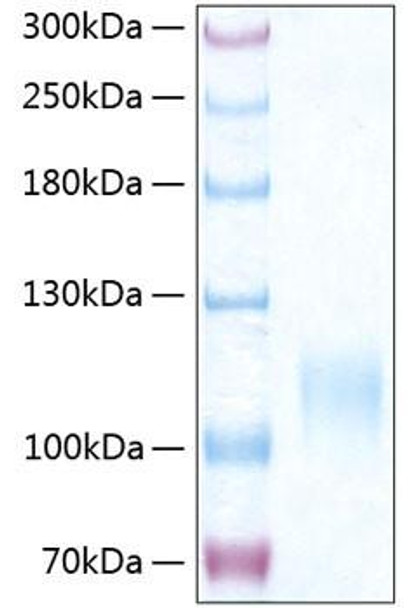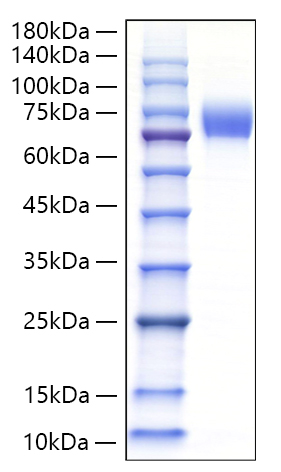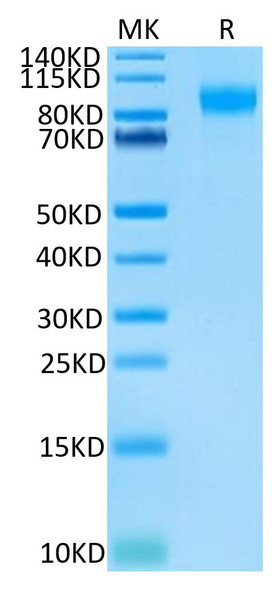Description
Recombinant Human E-selectin/SELE/CD62E Protein
The Recombinant Human E-selectin/SELE/CD62E Protein is a biologically active recombinant protein that plays a significant role in various cellular processes and signaling pathways in human biology. This protein is widely employed in immunological research, cell biology studies, protein-protein interaction analyses, and therapeutic development, providing researchers with a reliable tool for investigating E-selectin/SELE/CD62E function and its implications in health and disease.
This product (SKU: RPCB0404) is produced using HEK293 cells and features a C-His tag for convenient detection and purification. The protein exhibits a calculated molecular weight of 59.48 kDa with an observed molecular weight of 110-120 kDa under denaturing conditions, achieving ≥ 95 % as determined by SDS-PAGE.. Functional bioactivity has been validated through rigorous quality control assays, confirming its suitability for demanding research applications.
Key Features
| High Purity by Affinity Chromatography | |
| Mammalian & Bacterial Expression Systems | |
| High lot-to-lot consistency via strict QC |
| Product Name: | Recombinant Human E-selectin/SELE/CD62E Protein |
| SKU: | RPCB0404 |
| Size: | 10 μg , 20 μg , 50 μg , 100 μg |
| Reactivity: | Human |
| Synonyms: | SELE, CD62E, ELAM, ELAM1, ESEL, LECAM2 |
| Tag: | C-His |
| Expression Host: | HEK293 cells |
| Calculated MW: | 59.48 kDa |
| Observed MW: | 110-120 kDa |
| Gene ID: | 6401 |
| Protein Description: | High quality, high purity and low endotoxin recombinant Recombinant Human E-selectin/SELE/CD62E Protein (RPCB0404), tested reactivity in HEK293 cells and has been validated in SDS-PAGE.100% guaranteed. |
| Endotoxin: | Please contact us for more information. |
| Purity: | ≥ 95 % as determined by SDS-PAGE. |
| Formulation: | Lyophilized from a 0.22 μm filtered solution of PBS, pH 7.4.Contact us for customized product form or formulation. |
| Bio-Activity: | Measured by the ability of the immobilized protein to support the adhesion of U937 human histiocytic lymphoma cells. When 5 x 104cells/well are added to human E-Selectin/His Chimera coated plates (2 μg/mL with 100 μL/well), approximately 40-50% will adhere after 1 hour incubation at 37℃. |
| Reconstitution: | Centrifuge the vial before opening. Reconstitute to a concentration of 0.1-0.5 mg/mL in sterile distilled water. Avoid vortex or vigorously pipetting the protein. For long term storage, it is recommended to add a carrier protein or stablizer (e.g. 0.1% BSA, 5% HSA, 10% FBS or 5% Trehalose), and aliquot the reconstituted protein solution to minimize free-thaw cycles. |
| Storage: | Store at -20℃.Store the lyophilized protein at -20℃ to -80 ℃ up to 1 year from the date of receipt. After reconstitution, the protein solution is stable at -20℃ for 3 months, at 2-8℃ for up to 1 week. |
The protein is found in cytokine-stimulated endothelial cells and is thought to be responsible for the accumulation of blood leukocytes at sites of inflammation by mediating the adhesion of cells to the vascular lining. It exhibits structural features such as the presence of lectin- and EGF-like domains followed by short consensus repeat (SCR) domains that contain 6 conserved cysteine residues. These proteins are part of the selectin family of cell adhesion molecules. Adhesion molecules participate in the interaction between leukocytes and the endothelium and appear to be involved in the pathogenesis of atherosclerosis.







